Pressurfect® XP is a duplex (austenitic-ferritic) stainless steel used for high pressure gasoline direct injection (GDI) fuel systems. The grade is characterized by:
- Very good resistance to stress corrosion cracking (SCC)
- Good resistance to general corrosion and pitting
- High strength - approximately twice the proof strength of austenitic stainless steels
- Physical properties that offer design advantages
- Ease of fabrication and good toughness
Standards
- UNS: S32304
- EN Number: 1.4362
- EN Name: X2CrNiN23-4
Product standards
- ASTM A789, A790
- EN 10216-5
Approvals
- Approved by the American Society of Mechanical Engineers (ASME) Boiler and Pressure Vessel Code, Section VIII, div. 1 construction
- ASME B31.3 Process Piping
- VdTÜV-Werkstoffblatt 496
Chemical composition (nominal)
| C | Si | Mn | P | S | Cr | Ni | Mo | Cu | N |
|---|---|---|---|---|---|---|---|---|---|
| ≤0.030 | ≤1.0 | ≤2.0 | ≤0.035 | ≤0.015 | 22.5 | 4.5 | 0.3 | 0.3 | 0.1 |
Applications
Pressurfect® XP has been developed specifically for high-pressure fuel rails for gasoline direct injection (GDI) systems in next generation internal combustion engines.
Corrosion resistance
General corrosion
Due to the high chromium content and its well-balanced composition Pressurfect® XP possesses very good corrosion resistance in acidic environments. The table below gives the corrosion rate in different acids and Figures 1 - 3 show isocorrosion diagrams for Pressurfect® XP in sulfuric, formic and nitric acid, respectively.
Corrosion rates in acid-water mixtures, mm/year (mpy). Activated specimens, 1+3+3 days, average of the last two periods for two specimens.
| Concentration | Temperature | Corrosion rate, mm/year (mpy) | |
|---|---|---|---|
| Weight-% | ºC (ºF) | Pressurfect™ XP | ASTM 304L |
| Acetic acid, CH3COOH | |||
| 20 | B | 0.01 (0.4) | |
| 50 | B | 0 | 0.04 (1.6) |
| 70 | B | 0 | |
| 90 | B | 0.01 (0.4) | |
| Formic acid, HCOOH | |||
| 5 | 60 (140) | 0 | |
| 10 | B | 0.04 (1.6) | 0.80 (32) |
| 30 | 60 (140) | 0 | |
| 30 | 90 (194) | 0 | |
| 80 | 90 (194) | 0 | |
| 90 | 60 (140) | ||
| Hydrochloric acid, HCl | |||
| 0.5 | 40 (104) | 0 | |
| 1 | 40 (104) | 0.30 (12) | |
| Nitric acid, HNO3 (5x2 days) | |||
| 5 | B | 0.16 (6.4) | 0.16 (6.4) |
| Phosphoric acid, H3PO4 | |||
| 30 | B | 0.10 (4) | 0.20 (8) |
| 50 | 100 (212) | 0.04 (1.6) | 0.09 (3.6) |
| 60 | 90 (194) | 0.01 (0.4) | 0.2 (0.8) |
| 80 | 80 (176) | 0.01 (0.4) | 0.01 (0.4) |
| Sulfuric acid, H2SO4 | |||
| 5 | 60 (140) | 0 | |
| 5 | 90 (194) | 0.06 (2.4) | 3.6 (144) |
| 10 | 60 (140) | 0.10 (4) | |
| 10 | 70 (158) | 0.14 (5.6) | |
| 10 | 80 (176) | 0.20 (8) | |
| 15 | 50 (122) | 0.17 (6.8) | |
| 20 | 30 (86) | 0.20 (8) | |
B = Boiling
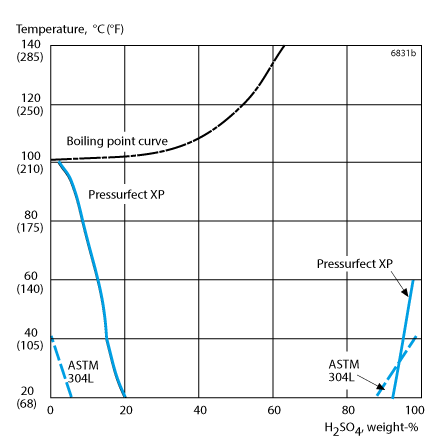 Figure 1. Isocorrosion diagram for Pressurfect XP and ASTM 304L in a naturally aerated stagnant sulfuric acid. The curves represent a corrosion rate of 0.1 mm/year (4 mpy).
Figure 1. Isocorrosion diagram for Pressurfect XP and ASTM 304L in a naturally aerated stagnant sulfuric acid. The curves represent a corrosion rate of 0.1 mm/year (4 mpy).
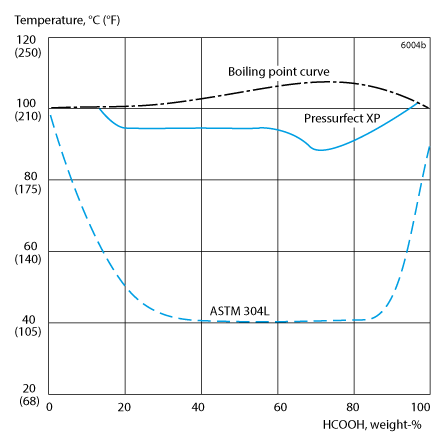 Figure 2. Isocorrosion diagram for Pressurfect XP and ASTM 304L in formic acid. The curves represent a corrosion rate of 0.1 mm/year (4 mpy).
Figure 2. Isocorrosion diagram for Pressurfect XP and ASTM 304L in formic acid. The curves represent a corrosion rate of 0.1 mm/year (4 mpy).
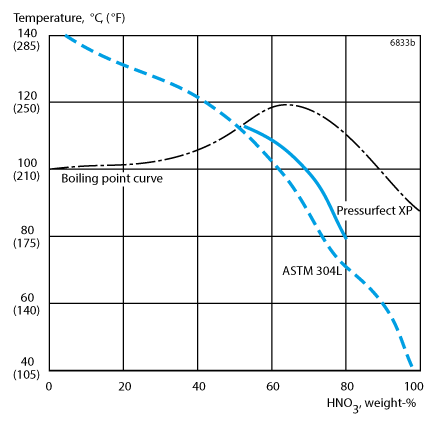 Figure 3. Isocorrosion diagram for Pressurfect XP and ASTM 304L in nitric acid. The curves represent a corrosion rate of 0.1 mm/year (4 mpy).
Figure 3. Isocorrosion diagram for Pressurfect XP and ASTM 304L in nitric acid. The curves represent a corrosion rate of 0.1 mm/year (4 mpy).
Pitting
The pitting resistance of stainless steel is determined primarily by its chromium, molybdenum and nitrogen contents. Manufacturing and fabrication practices, e.g. welding, are also of vital importance for the actual performance in service, where resistance to pitting is concerned.
One parameter for comparing the pitting resistance of different steels is the PRE-number (Pitting Resistance Equivalent).
The PRE is defined as, in weight-%: PRE = % Cr + 3.3 %x Mo + 16 x % N
The minimum PRE numbers for Pressurfect® XP and the standard austenitic stainless steel ASTM 304L is given in the following table.
| Alloy | %Cr | %Mo | %N | PRE min. |
|---|---|---|---|---|
| Pressurfect XP | 23 | - | 0.1 | 24 |
| ASTM 304L | 18.4 | - | - | 18 |
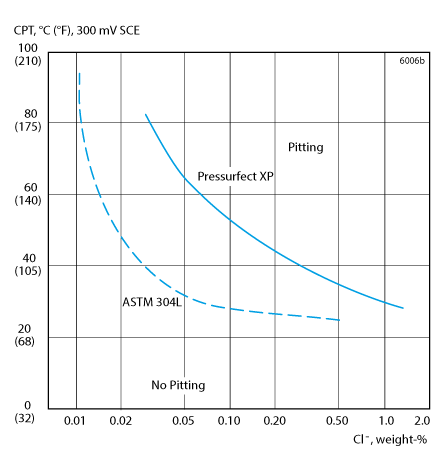 Figure 4. Critical pitting temperature (CPT) for Pressurfect XP and ASTM 304L in neutral chloride solutions (potentiostatic determination at +300 mV/SVE).
Figure 4. Critical pitting temperature (CPT) for Pressurfect XP and ASTM 304L in neutral chloride solutions (potentiostatic determination at +300 mV/SVE).
Crevice corrosion
As is the case for pitting corrosion, the resistance to crevice corrosion is related to the chromium, molybdenum and nitrogen contents. Thus, Pressurfect® XP possesses better resistance to crevice corrosion than steels of the ASTM 304/304L type.
Stress corrosion and cracking
Because of its two-phase structure and its well-balanced composition, Pressurfect® XP possesses very good resistance to stress corrosion cracking (SCC). This is evident from the results of tests in both concentrated chloride solutions and oxygen-containing dilute chloride environments.
Figure 5 shows the results of tests carried out in 40% CaCl2 solution at 100°C (212°F). In this environment, the stress that is required to cause fracture due to SCC (known as the threshold stress) is much higher for Pressurfect® XP than for ASTM 304/304L. This demonstrates the superior resistance of Pressurfect® XP.
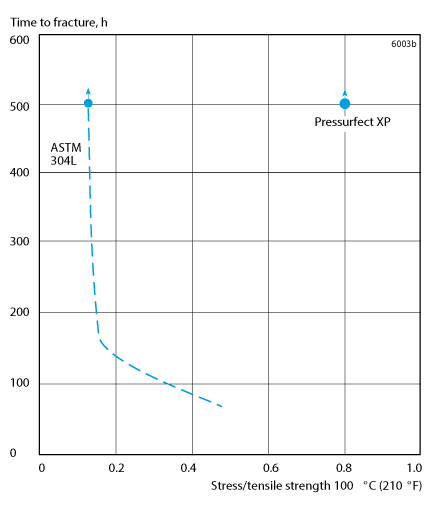
Figure 5. Results of SCC tests with constant load on Pressurfect® XP and ASTM 304L in 40% CaCl2, pH = 6.5, at 100°C (210°F) with aerated test solution. The results in Figure 5 indicate that Pressurfect XP can be used in dilute oxygen-bearing chloride solutions up to about 125°C (260°F) without any risk of SCC. This is much higher than for ASTM 304/ 304L, which should not be used above 60°C (140°F) in such environments.
The results of SCC testing of Pressurfect® XP in chloride solutions at high temperatures and pressures are presented in Figure 6. The curve for Pressurfect® XP is based on tests performed in various chloride contents and at different temperatures. Usually six separate measurements were taken at each measuring point. The testing method involved spring-loaded specimens stressed to the proof strength (Rp0.2) at the testing temperature, or U-bends in which the stress at the apex is at least equal to the proof strength of the solution annealed material. The oxygen content of the inlet water (refreshed autoclaves were used) was 4.6 to 10 ppm and the pH 4.5 to 7. The curve for ASTM 304/304L is based on published test results and on practical experience.
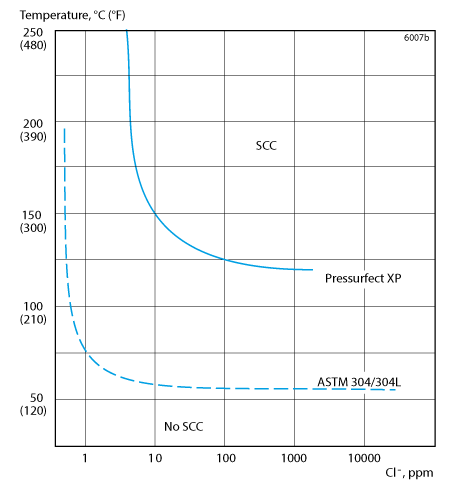 Figure 6. SCC resistance in oxygen-bearing (approximately 8 ppm) neutral chloride solutions. Testing time 1000 hours. Load > yield strength at testing temperature.
Figure 6. SCC resistance in oxygen-bearing (approximately 8 ppm) neutral chloride solutions. Testing time 1000 hours. Load > yield strength at testing temperature.
Intergranular corrosion
Pressurfect® XP is a modern duplex stainless steel in which the reformation of austenite in the heat-affected zone adjacent to the weld takes place quickly. This results in a microstructure that gives corrosion properties and toughness similar to that of the parent metal. Welded joints in Pressurfect® XP easily pass the Strauss intergranular corrosion test according to SS-EN ISO 3651-2 Method A.
Corrosion fatigue
Pressurfect® XP possesses higher strength and better corrosion resistance than ordinary austenitic stainless steels. Consequently, Pressurfect® XP has considerably better fatigue strength under corrosive conditions than such steels.
Forms of supply
Pressurfect® XP seamless duplex stainless steel tubes are supplied in the bright annealed condition.
| Outside diameter, mm | Wall thickness, mm |
|---|---|
| 8.0 - 12.0 | 0.89 - 3.0 |
| 18.0 - 30.0 | 0.89 - 3.0 |
Other dimensions can be supplied on request
| Wall-thickness tolerance | OD tolerance |
|---|---|
| +/- 10% | +/- 0.75% with a minimum of +/- 0.08 mm |
For special tolerance requirements, please contact Alleima.
Surface roughness
- OD ≥ 15 mm Ra (outside) ≤ 1.0 µm (by polishing)
- OD ≥ 15 mm Ra (inside) ≤ 2.0 µm - depending on the wall-thickness/outside diameter ratio
For special roughness requirements please contact Alleima.
Mechanical properties
| Proof strength | Tensile strength | Elong. | Hardness | |
|---|---|---|---|---|
| Rp0.2a | Rm | Ab | A2" | HRC |
| MPa | MPa | % | % | |
| ≥450 | 690-820 | ≥25 | ≥25 | ≤30 |
| Proof strength | Tensile strength | Elong. | Hardness | |
|---|---|---|---|---|
| Rp0.2a | Rm | Ab | A2" | HRC |
| ksi | ksi | % | % | |
| ≥65 | 100-119 | ≥25 | ≥25 | ≤30 |
1 MPa = 1N/mm2
a) Rp0.2 corresponds to 0.2% offset yield strength.
b) Based on L0 = 5.65 √S0 where L0 is the original gauge length and S0 the original cross-section area.
At high temperatures
If Pressurfect® XP is exposed to temperatures exceeding 280°C (540°F), for prolonged periods, the microstructure changes, which results in a reduction in impact strength. This does not necessarily affect the behavior of the material at the operating temperature. For example, heat exchanger tubes can be used at higher temperatures without any problems. Please contact Alleima for more information. For pressure vessel applications, 280°C (540°F) is required as a maximum according to VdTÜV-Wb 496.
| Temperature | Proof strength |
|---|---|
| Rp0.2 | |
| ºC | MPa |
| min | |
| 50 | 420 |
| 100 | 380 |
| 150 | 360 |
| 200 | 340 |
| 250 | 330 |
| 300 | 310 |
| Temperature | Proof strength |
|---|---|
| Rp0.2 | |
| ºF | ksi |
| min | |
| 120 | 61.0 |
| 200 | 56.0 |
| 300 | 52.0 |
| 400 | 49.0 |
| 500 | 47.5 |
| 600 | 46.0 |
Physical properties
Density: 7.8 g/cm3, 0.28 lb/in3
Specific heat capacity
| Temperature, ºC | J/(kg ºC) | Temperature, ºF | Btu/(lb ºF) |
|---|---|---|---|
| 20 | 490 | 68 | 0.12 |
| 100 | 505 | 200 | 0.12 |
| 200 | 530 | 400 | 0.13 |
Thermal conductivity
| Temperature ºC | 20 | 100 | 200 |
|---|---|---|---|
| Thermal conductivity W/(m ºC) | |||
| Pressurfect XP | 16 | 17 | 18 |
| ASTM 304L | 15 | 16 | 18 |
| Temperature ºF | 68 | 200 | 400 |
|---|---|---|---|
| Thermal conductivity Btu/(ft h ºF) | |||
| Pressurfect XP | 9 | 9.5 | 10.5 |
| ASTM 304L | 8.5 | 9.5 | 10.5 |
Thermal expansion
Mean values in temperature ranges (x10-6)
Pressurfect XP has a far lower coefficient of thermal expansion than austenitic stainless steels and therefore possesses certain design advantages.
| Temperature ºC | 30-100 | 30-200 |
|---|---|---|
| Per ºC | Per ºC | |
| Pressurfect XP | 13.5 | 14.0 |
| Carbon steel | 12.5 | 13.0 |
| ASTM 304L | 16.5 | 17.0 |
| Temperature ºF | 86-200 | 86-400 |
|---|---|---|
| Per ºF | Per ºF | |
| Pressurfect XP | 7.5 | 8.0 |
| Carbon steel | 7.0 | 7.0 |
| ASTM 304L | 9.5 | 9.5 |
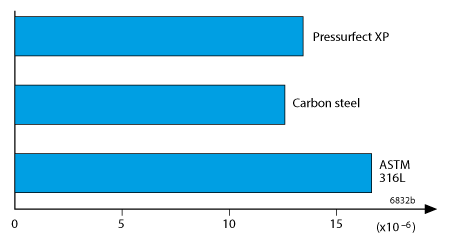 Figure 7. Thermal expansion, per °C (30-100°C, 86-210°F).
Figure 7. Thermal expansion, per °C (30-100°C, 86-210°F).
| Temperature, ºC | MPa | Temperature, ºF | ksi |
|---|---|---|---|
| 20 | 200 | 68 | 29.0 |
| 100 | 194 | 200 | 28.2 |
| 200 | 186 | 400 | 27.0 |
Machining
Being a two-phase material (austenitic-ferritic), Pressurfect® XP will present a different tool wear profile from that of single-phase steels of type ASTM 304L. The cutting speed must, therefore, be slightly lower than that recommended for ASTM 304L.
Disclaimer: Recommendations are for guidance only, and the suitability of a material for a specific application can be confirmed only when we know the actual service conditions. Continuous development may necessitate changes in technical data without notice. This datasheet is only valid for Alleima materials.